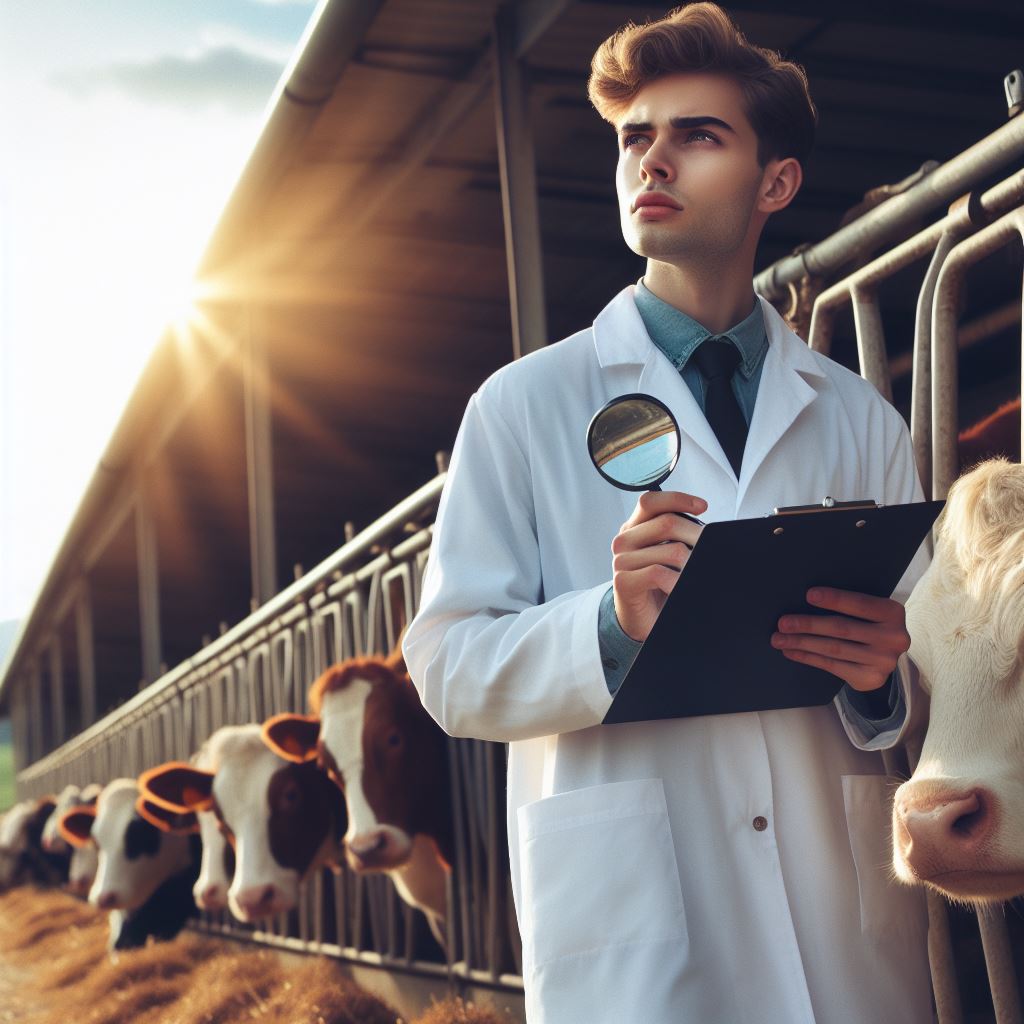Introduction
Pest control in the agricultural industry is a crucial aspect that ensures the protection of crops and livestock.
Agri scientists play a vital role in the development of effective pest control methods.
This blog post aims to explore the innovative approaches and contributions of agri scientists in pest control.
Pests can cause significant damage to agricultural crops and result in economic losses for farmers.
Therefore, it is imperative to employ effective strategies to combat pest infestations.
Agri scientists, with their expertise in the field of agriculture and biology, contribute immensely to this aspect by developing innovative methods to control pests.
The purpose of this blog post is to shed light on the various ways in which agri scientists contribute to pest control.
Through their research and experimentation, they come up with novel solutions to combat pests, ensuring sustainable and efficient agricultural practices.
Agri scientists not only focus on chemical-based pest control methods but also delve into biological and integrated pest management techniques.
They strive to find environmentally friendly alternatives that minimize the use of harmful pesticides and maintain ecological balance.
By understanding the behavior and biology of pests, agri scientists are able to devise strategies that are specific to each pest species.
They also conduct trials to evaluate the effectiveness of different pest control methods, ensuring optimal results for farmers.
In a nutshell, the contribution of agri scientists in the field of pest control is invaluable.
Through their dedication and expertise, they develop innovative and eco-friendly methods that protect agricultural crops and improve overall productivity in the agricultural industry.
Role of Agri Scientists in Pest Control
Agri scientists play a significant role in pest control in the agricultural industry. They study pests and their behavior to develop effective strategies for control.
Role of Agri Scientists in Studying Pests and Their Behavior
Agri scientists are responsible for studying pests and gaining an in-depth understanding of their behavior. By doing so, they can develop effective pest control methods to safeguard crops and ensure higher agricultural productivity.
Agri scientists identify and classify different types of pests based on various factors:
- Visual identification: They observe the physical characteristics of pests to determine their species.
- Behavioral patterns: Scientists study the unique behaviors exhibited by pests to categorize them into different groups.
- Morphological features: Examination of pests’ physical attributes helps in determining their classification.
Understanding pest biology is crucial for effective pest control:
- Life cycle: Agri scientists analyze the life cycle of pests to identify vulnerable stages for intervention.
- Reproductive patterns: Knowledge of pests’ reproduction helps in controlling their population growth.
- Feeding habits: Understanding pests’ eating preferences allows scientists to design targeted control methods.
Vital role of Agri scientists in developing effective pest control strategies
Agri scientists play a vital role in developing effective pest control strategies:
- Research and testing: They conduct extensive research and experimentation to evaluate the efficacy of pest control methods.
- Chemical analysis: Scientists identify pesticides that can effectively target specific pests while minimizing harm to the environment and beneficial organisms.
- Integrated Pest Management (IPM): Agri scientists promote IPM techniques, which combine multiple strategies for maximum pest control efficiency.
Agri scientists highlight the importance of monitoring pests in farms:
- Early detection: Regular monitoring allows for the early identification of pest infestations, enabling prompt action.
- Preventive measures: Scientists develop preventive measures based on pest monitoring data to reduce the risk of infestation.
- Threshold determination: Agri scientists set pest population thresholds to trigger appropriate control measures.
Scientists collaborate with farmers and agricultural experts:
- Training and education: They provide training and educational resources to farmers on pest identification, prevention, and control.
- Advisory services: Agri scientists offer guidance and recommendations to farmers based on pest control best practices.
- Technological advancements: Scientists integrate new technologies into pest control methods, improving efficiency and precision.
The role of agri scientists goes beyond pest control:
- Environmental impact: They assess the ecological impact of pest control measures and promote sustainable practices.
- Policy development: Agri scientists contribute to the development of policies and regulations concerning pest control in agriculture.
- Research and innovation: Scientists continuously conduct research, seeking innovative solutions to combat emerging pest threats.
In essence, agri scientists are at the forefront of pest control in agriculture. Through their extensive studies, they identify, classify, and understand pests’ biology, contributing to the development of effective control strategies.
Their collaboration with farmers and dedication to research ensures sustainable and productive agricultural practices.
Read: Future of Agri-Environmental Management in AU
Pest Control Methods Developed by Agri Scientists
Pests are a major concern in agriculture, causing significant damage to crops and threatening food security. Over the years, agricultural scientists have developed various pest control methods to combat these destructive creatures.
In this blog section, we will delve into some of the most effective techniques devised by these scientists.
Biological control
Agri scientists have recognized the importance of maintaining a balance in the ecosystem. They utilize natural predators and parasites to control pests.
These beneficial organisms are introduced into the agricultural fields to prey on the harmful pests, effectively reducing their population.
The effectiveness of these methods varies depending on several factors such as the type of pest, the crop being grown, and environmental conditions.
Biological control can be highly successful when the natural predators or parasites have a strong impact on the target pest. However, it requires careful monitoring and adjustments to maintain the predator-prey balance.
Chemical control
One of the most common pest control methods is the use of pesticides and insecticides.
Agricultural scientists have made tremendous progress in developing chemical compounds that specifically target pests, while minimizing the impact on beneficial insects and the environment.
These chemicals are applied to crops to eliminate or inhibit the growth of pests.
Your Personalized Career Strategy
Unlock your potential with tailored career consulting. Get clear, actionable steps designed for your success. Start now!
Get StartedChemical control, while effective in the short term, has raised concerns over its potential negative impact on human health and the environment.
Agri scientists strive to develop safer pesticides that are highly targeted, decompose quickly, and have minimal residual effects.
Cultural control
Agri scientists promote cultural practices that help prevent and manage pest infestations. By implementing appropriate farming practices, such as crop rotation, intercropping, and companion planting, they create an unfavorable environment for pests.
These practices disrupt pest life cycles, reduce pest populations, and safeguard the crops.
Cultural control methods are highly sustainable and eco-friendly. They not only help manage pests but also improve soil health and promote biodiversity.
However, they may require significant changes in farming practices and may not always provide complete pest control.
Genetic control
In recent decades, agri scientists have made significant advancements in genetic engineering. They have successfully developed genetically modified (GM) pest-resistant crops.
These crops possess genes that provide resistance against specific pests, minimizing the need for chemical pesticides. By developing GM crops, scientists have revolutionized pest control practices, making them more sustainable and efficient.
Now that we have explored the different pest control methods developed by agricultural scientists, let’s discuss their effectiveness and potential impacts.
Genetic control through GM crops has shown promising results in reducing pest damage and increasing crop yields.
However, it is important to address concerns related to the potential spread of modified genes to wild populations and the unintended consequences of manipulating the plant genome.
In fact, agricultural scientists have made remarkable progress in pest control methods. Each method has its strengths and weaknesses, and the choice of method often depends on the specific pest problem and the desired outcome.
It is crucial to continue researching and developing sustainable pest control techniques to ensure a resilient and secure food production system.
Agricultural scientists play a vital role in safeguarding our crops and protecting our food supply from destructive pests.
Read: Biodiversity: Enviro Manager’s Role in AU
Challenges Faced by Agri Scientists in Pest Control
Pesticide Resistance
Agri scientists often face the challenge of pests developing resistance to chemical control methods.
Pests can adapt to the pesticides used, rendering them ineffective in controlling their populations.
Scientists constantly need to develop new pesticides or modify existing ones to combat resistance.
This requires extensive research and testing to ensure the effectiveness and safety of the new control methods.
Environmental Impact
Agri scientists recognize the need to develop environmentally-friendly pest control solutions.
Chemical pesticides can have negative effects on ecosystems, polluting water sources and harming non-target organisms.
Stand Out with a Resume That Gets Results
Your career is worth more than a generic template. Let us craft a resume and cover letter that showcase your unique strengths and help you secure that dream job.
Get HiredScientists strive to find alternatives that are less harmful to the environment, such as biological control methods.
These methods involve using natural enemies of pests or introducing genetically modified organisms to control pest populations.
Public Perception
Agri scientists face concerns and controversies surrounding the use of certain pest control methods.
There is often public opposition to chemical pesticides due to their potential health risks and environmental impact.
Scientists must address these concerns and work towards developing safer and more sustainable pest control options.
Engaging with the public, conducting outreach programs, and providing education can help improve public perception.
Agri scientists face significant challenges in the field of pest control.
They need to combat pesticide resistance, develop environmentally-friendly solutions, and address public concerns.
Through research, innovation, and engagement, they strive to create effective and sustainable pest control methods.
Ultimately, their work is crucial in ensuring food security and minimizing the impact of pests on crops and ecosystems.
Read: Renewable Energy in AU Farms: Enviro Impact

Future Directions in Agri Pest Control
Pest control has long been a critical aspect of ensuring the successful growth and cultivation of crops. Agri scientists are constantly exploring new and innovative methods to protect crops from pests.
In this blog section, we will discuss the emerging trends and future directions in pest control methods developed by these dedicated scientists.
Integrated Pest Management (IPM)
One of the most prominent shifts in pest control approaches is the adoption of Integrated Pest Management (IPM) strategies. Agri scientists now recognize the limitations of relying solely on chemical pesticides and are moving towards a more holistic approach.
IPM focuses on utilizing a combination of techniques aimed at minimizing pesticide use while maximizing effectiveness.
This approach involves monitoring pest populations, implementing cultural and biological controls, and only resorting to pesticides when absolutely necessary.
Transform Your LinkedIn for Maximum Impact
Elevate your professional brand with a LinkedIn profile that attracts recruiters, showcases your expertise, and maximizes opportunities. Stand out in your industry with a profile built for success.
Boost ProfileThe benefits of IPM are two-fold. Firstly, it allows for a significant reduction in the use of chemical pesticides, which can be harmful to the environment and human health.
Secondly, IPM promotes the conservation of natural enemies that prey on pests, creating a more balanced and sustainable ecosystem.
Sustainable Practices
In recent years, there has been a growing emphasis on environmentally sustainable pest control methods. Agri scientists are recognizing the importance of preserving our ecosystems and minimizing the negative impacts of pest control on the environment.
Sustainable practices include the use of biological control agents such as predatory insects, parasites, and pathogens. These natural enemies help maintain pest populations at manageable levels.
Additionally, crop rotation, trap cropping, and beneficial planting practices are being implemented to deter pests and enhance natural defenses.
Furthermore, the use of organic pesticides is gaining popularity. These formulations are derived from natural sources and are less harmful to beneficial insects and other non-target organisms.
Technological Advancements
Agri scientists are harnessing technology to develop more effective pest control solutions. Technological advancements have opened up new avenues for pest detection, monitoring, and control.
Remote sensing technologies, such as drones and satellites, are being used to identify pest hotspots and monitor crop health. This allows for targeted interventions and reduces the need for widespread pesticide application.
Furthermore, precision agriculture techniques are being employed to optimize pesticide application. By using GPS and sensor technologies, farmers can apply pesticides only where it is needed, minimizing waste and maximizing effectiveness.
Another exciting area of development is the use of genetic engineering. Agri scientists are exploring genetically modified pest-resistant crops that can naturally defend against pests, reducing the need for chemical intervention.
The future of agri pest control is evolving towards more sustainable and holistic approaches. Integrated Pest Management, sustainable practices, and technological advancements are reshaping the way we protect our crops.
By prioritizing environmentally friendly methods, agri scientists are not only safeguarding our harvests but also ensuring the long-term health of our planet.
As the field continues to progress, we can look forward to even more innovative and effective pest control solutions.
Read: Tech Advances in Enviro Management: AU Focus
Explore Further: Australian Mining Engineers: A Day in the Life
Delve into the Subject: Eco-Friendly Innovations in Aussie Agriculture
Conclusion
In closing, agricultural scientists play a pivotal role in pest control, employing innovative methods to safeguard crops and ensure food security.
Their proactive approach not only mitigates crop losses but also promotes sustainable agriculture practices.
It is imperative to acknowledge the invaluable contribution of these scientists in maintaining a resilient food supply chain and protecting the environment.
As guardians of crop health, agricultural scientists continuously strive to develop and refine pest control strategies.
Their unwavering dedication and pioneering research efforts are indispensable in addressing the evolving challenges posed by pests and diseases.
By staying informed about the latest advancements in pest control methods pioneered by agricultural scientists, individuals can actively contribute to the promotion of sustainable farming practices and the preservation of agricultural ecosystems.
In a world where food security is increasingly threatened by climate change and environmental degradation, the role of agricultural scientists in pest control cannot be overstated.
Through their tireless endeavors, they not only safeguard the livelihoods of farmers but also ensure access to safe and nutritious food for communities worldwide.
Let us continue to support and champion the efforts of agricultural scientists as they lead the charge towards a more resilient and sustainable future for agriculture.




